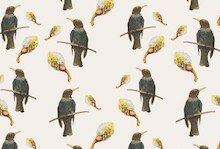
Vivian Smith was born in Hobart in 1933. He lectured in the French Department of the University of Tasmania until 1967 when he moved to Sydney to become a Reader in the Department of English, University of Sydney. After a distinguished career as an academic, he retired in 1996. He is a highly respected critic, having produced key studies on Australian literature and contributed much to the growth and sophistication of criticism surrounding Australian poetry. From 1975 to 1990 he was the literary editor of Quadrant. Smith's first book of poetry, The Other Meaning, was published in 1956 and he has since published seven further collections, among which Tide Country won the New South Wales Premier's Prize for Poetry and the Grace Leven Prize. A new and eagerly anticipated volume titled Along the Line is in preparation.
Vivian Smith’s work is finely made, gentle, given to subtleties and silences as it follows its subjects with care and great respect. Smith’s poems are never forced nor excessive, each word is placed with a masterly attention to the rhythms of line and the evolution of voice, so much so that the voice gains a remarkable fullness, a speaking presence that moves beyond the mirage and miasma of mere representation. There is a richness to Smith’s simply spoken evocations that delves beyond the images of the often solitary figure moving through the suburban or the foreign alike, and speaks to the reader directly from the immediate and personal. Smith’s extraordinarily well-crafted poetry is refined further, to the point of great poetry, by an honest expression and respect for personal experience, and a belief in poetry as a shared communicative act. While at times circumspect (out of respect for the reader as much as for its subjects), Smith does not seek to conceal nor ironise experience, but create an art that reveals experience honestly and openly, and provides the reader with fresh insights into commonality of death, love and being in the world. He once commented:
I would like my poems to be absolutely true and genuine – written from the heart as they say, true to experience and feeling and meaning. I know this is a complicated question. Poetry is a craft as well as an art. But I think experienced readers do agree on this notion of truth and honesty in writing – true to art, honest to experience. Whatever the theoretical or critical questions that abound, there are works of art which bring comfort and revelation and benefit to many people still. Art might be the most beautiful lies as Mark Twain said, but some things are truer than others. No one doubts or questions the sheer honesty of Keats’ Odes or the poetry of Rimbaud or Cavafy.
A poem such as ‘Traveller’s Tale’ illustrates this relation to truth in Smith’s writing (Ed. Note: please read the poem before going any further!). Here Smith unravels a tale – not quite cautionary, not simply moral – where the pathos of tempus fugit is beautifully evoked. In this almost Borgesian tale, Smith manages with delicacy and extreme tact to render the flow of life from the passions of youth to the passing of age into death. Nothing is wasted in this poem, each foot is perfectly placed right up unto the final lines where the poem reverses upon itself, rewriting itself in the mystery of the speaker’s displacement between life and death. The reader is left with the possibility that between the night and the dawn where the voice begins, the voice has moved beyond itself into a ghost-like presence. That ghost-like presence of the voice would be Orphic except for being so finely spun, so human and tangible, drawn from this world and not an underworld, reflecting the truths of here rather than the shadows of an elsewhere.
In another of the poems presented here, ‘Tune’, a solitary speaker traces out a journey across Europe where he has been haunted by the same Andean tune. What unfolds is a remarkable evocation of dispossession and dislocation, the universal search for community and home (expressed finally in the line “hungry for home and all its idioms” which is as near perfection as poetry might come). This delicate lyric, as do many of Smith’s poems, conjuring a “cry of joy, its almost desolation”, balances pathos with a robust if quietly spoken joy in the world.
Vivian Smith’s poetry stands out within the field of Australian poetry as one of its most distinguished and dignified voices, lending Australian literature not simply erudition and refinement but truth and intellectual vigor.
New poems!
Happiness
Back in Hobart
Twenty Years of Sydney
The Dream
The Room
1993
Nightlife
Poems after Paul Celan: Corona
Poems after Paul Celan: Flower
Poems after Paul Celan: In Praise of Distance
Poems after Paul Celan: Menhir
Poems after Paul Celan: Ich bin allein
Poems after Paul Celan: The Whitest Dove of All
Poems after Paul Celan: Sleep Then
Poems
Mosman Bay
On the Circuit
Tune
Traveller's Tale
Bibliography
Poetry
The Other Meaning (1956)
An Island South (1967)
Familiar Places (1978)
Tide Country (1982)
Selected Poems (1985)
New Selected Poems (1995)
Late News (1999)
Criticism
James McAuley (1970)
Vance and Netter Palmer (1975)
The Letters of Vance and Nettie Palmer (1977)
The Poetry of Robert Lowell (1981)
Patrick White: A Bibliography (with Brian Hubber, 2004)
Anthology
Sydney’s Poems (editor with Robert Gray, 1992)
Links
Double dialogues
Vivian Smith interviewed by Australian poet and critic David McCooey.







